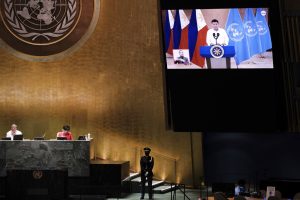Philippine President Rodrigo Duterte said on Tuesday that anyone found to have behaved illegally in his brutal campaign against illegal drugs would be held accountable under national laws.
In an address to the United Nations General Assembly on Tuesday, Duterte said that he had instructed the Philippine National Police and Department of Justice to review the conduct of the campaign, in which thousands of suspected drug dealers have been killed since the beginning of his presidential term in 2016.
“Those found to have acted beyond bounds during operations shall be made accountable before our laws,” Duterte said in a video address to the world body.
While Duterte made no mention of it, his address followed last week’s authorization by the International Criminal Court (ICC) of a formal investigation into his “drug war.” It gave a green light for a full probe into the “war on drugs” campaign, describing it as a “widespread and systematic attack against the civilian population.”
According to a September 15 statement from the ICC, the judges ruled that “based on the facts as they emerge at the present stage and subject to proper investigation and further analysis, the so-called ‘war on drugs’ campaign cannot be seen as a legitimate law enforcement operation, and the killings neither as legitimate nor as mere excesses in an otherwise legitimate operation.”
Activists accuse police of murdering unarmed suspects on a massive scale. The full death toll of the ongoing campaign is unclear. Duterte’s administration itself acknowledges that more than 6,000 people have been killed since the beginning of the campaign, but independent estimates put the total as high as 20,000.
Following the ICC’s announcement, Duterte’s spokesperson Harry Roque said that the government will refuse to cooperate with the court, and said that the 76-year-old leader would rather “die first” before facing an international tribunal.
Duterte was more diplomatic in his U.N. speech, but was similarly dismissive of outside involvement in the Philippines’ affairs. “Meaningful change, to be enduring, must come from within,” he said. “The imposition of one’s will over another – no matter how noble the intent – has never worked in the past. And it never will in the future.”
Duterte also made an offering to the Assembly, promising that the Philippines would welcome an unspecified number of Rohingya Muslim refugees who had fled violence in Myanmar over the past five years. “The Philippines has limited resources during these extraordinary times. But what we can do for humanity and to uplift human dignity, we will,” Duterte said.
In addition to promising accountability for the “drug war,” Duterte called for legal accountability in the South China Sea, describing a 2016 arbitral tribunal award that struck down virtually all of China’s claims in disputed parts of the waterway as “a benefit across the world to all who subscribe to the majesty of the law.”
“No amount of willful disregard by any country however big and powerful can diminish the Arbitral Award’s importance,” he said, adding, “A world without law is a world of disaster.”
This echoed the comments that Duterte made to the last session of the UNGA in September 2020, when he similarly described the arbitral ruling as “beyond compromise and beyond the reach of passing governments to dilute, diminish, or abandon.”
Of course, both of these speeches jarred with the actual actions of his administration, which purposely laid aside the ruling in favor of attempting to gain infrastructure funding and other support from Beijing.
This perhaps offers an opportunity to meditate on the wide gap that often separates his scripted international appearances from his extempore remarks, which arguably offer a more accurate insight into his instincts and personal views.
While it is possible that Duterte has changed his views on the arbitral award, his praise for the “majesty of the law” fits awkwardly with a career rich with the use of extra-judicial means to solve social problems like drug use, from the streets of Davao City to the Malacañang Palace. It also suggests that despite Duterte’s promises, legal redress for the victims of the “war on drugs” will not be forthcoming as long as he or his allies are in power.

































